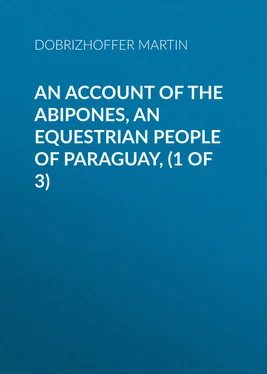Martin Dobrizhoffer - An Account of the Abipones, an Equestrian People of Paraguay, (1 of 3)
Здесь есть возможность читать онлайн «Martin Dobrizhoffer - An Account of the Abipones, an Equestrian People of Paraguay, (1 of 3)» — ознакомительный отрывок электронной книги совершенно бесплатно, а после прочтения отрывка купить полную версию. В некоторых случаях можно слушать аудио, скачать через торрент в формате fb2 и присутствует краткое содержание. Жанр: foreign_antique, foreign_prose, на английском языке. Описание произведения, (предисловие) а так же отзывы посетителей доступны на портале библиотеки ЛибКат.
- Название:An Account of the Abipones, an Equestrian People of Paraguay, (1 of 3)
- Автор:
- Жанр:
- Год:неизвестен
- ISBN:нет данных
- Рейтинг книги:3 / 5. Голосов: 1
-
Избранное:Добавить в избранное
- Отзывы:
-
Ваша оценка:
- 60
- 1
- 2
- 3
- 4
- 5
An Account of the Abipones, an Equestrian People of Paraguay, (1 of 3): краткое содержание, описание и аннотация
Предлагаем к чтению аннотацию, описание, краткое содержание или предисловие (зависит от того, что написал сам автор книги «An Account of the Abipones, an Equestrian People of Paraguay, (1 of 3)»). Если вы не нашли необходимую информацию о книге — напишите в комментариях, мы постараемся отыскать её.
An Account of the Abipones, an Equestrian People of Paraguay, (1 of 3) — читать онлайн ознакомительный отрывок
Ниже представлен текст книги, разбитый по страницам. Система сохранения места последней прочитанной страницы, позволяет с удобством читать онлайн бесплатно книгу «An Account of the Abipones, an Equestrian People of Paraguay, (1 of 3)», без необходимости каждый раз заново искать на чём Вы остановились. Поставьте закладку, и сможете в любой момент перейти на страницу, на которой закончили чтение.
Интервал:
Закладка:
My three wood Indians wore their hair dishevelled, cropped, and without a bandage. The youth neither had his lip perforated, nor his head crowned with parrot feathers. The mother and daughter had no ear-rings, though the former wore round her neck a cord from which depended a small heavy piece of wood, of a pyramidal shape, so that by their mutual collision they made a noise at every step. At first sight I asked the old woman whether she used this jingling necklace to frighten away the gnats; and I afterwards substituted a string of beautifully coloured glass-beads, in place of these wooden weights. The mother and son were tall and well-looking, but the daughter had so fair and elegant a countenance, that a poet would have taken her for one of the nymphs or dryads, and any European might safely call her beautiful. She united a becoming cheerfulness with great courtesy, and did not seem at all alarmed at our arrival, but rather enlivened. She laughed heartily at our Guarany, and we, on the other hand, at her's . For as this insulated family had no intercourse with any but themselves, their language was most ridiculously corrupted. The youth had never seen a female except his mother and sister, nor any male but his father. The girl had seen no woman but her mother nor any man but her brother, her father having been torn to pieces by a tiger before she was born. To gather the fruits that grew on the ground or on the trees, and wood for fuel, the dexterous girl ran over the forest tangled as it was with underwood, reeds, and brambles, by which she had her feet wretchedly scratched. Not to go unattended, she commonly had a little parrot on her shoulder, and a small monkey on her arm, unterrified by the tigers that haunt that neighbourhood. The new proselytes were quickly clothed in the town, and served with the daily allowance of food before the rest. I also took care they should take frequent excursions to the neighbouring woods, to enjoy the shade and pleasant freshness of the trees, to which they had been accustomed. For we found by experience, that savages removed to towns often waste away from the change of food and air, and from the heat of the sun, which powerfully affects their frames, accustomed, as they have been from infancy, to moist, cool, shady groves. The same was the fate of the mother, son, and daughter in our town. A few weeks after their arrival they were afflicted with a universal heaviness and rheum, to which succeeded a pain in the eyes and ears, and, not long after, deafness. Lowness of spirits, and disgust to food at length wasted their strength to such a degree that an incurable consumption followed. After languishing some months, the old mother, who had been properly instructed in the Christian religion and baptized, delivered up her spirit, with a mind so calm, so acquiescent with the divine will, that I cannot doubt but that she entered into a blessed immortality. The girl, who had entered the town full of health and beauty, soon lost all resemblance to herself. Enfeebled, withering by degrees like a flower, her bones hardly holding together, she at length followed her mother to the grave, and, if I be not much deceived, to Heaven. Her brother still surviving was attacked by the same malady that proved fatal to his mother and sister, but being of a stronger constitution overcame it. The measles, which made great havoc in the town, left him so confirmed in health that there seemed nothing to be feared in regard to him. He was of a cheerful disposition, went to church regularly, learnt the doctrines of Christianity with diligence, was gentle and compliant to all, and in every thing discovered marks of future excellence. Nevertheless, to put his perseverance to the proof, I thought it best to delay his baptism a little. At this time an Indian Christian, a good man and rich in land, who, at my orders, had received this catechumen into his house, came to me and said, "My father, our wood Indian is in perfect health of body, but seems to have gone a little astray in mind: he makes no complaints, but says that sleep has deserted him, his mother and sister appearing to him every night in a vision, saying, in a friendly tone, 'Suffer thyself, I pray thee, to be baptized. We shall return to take thee away, when thou dost not expect it.' This vision, he says, takes away his sleep." "Tell him," answered I, "to be of good heart, for that the melancholy remembrance of his mother and sister, with whom he has lived all his life, is the probable cause of these dreams, and that they, as I think, are gone to Heaven, and have nothing more to do with this world." A few days after, the same Indian returns, giving the same account as before, and with confirmed suspicions respecting the fearful delirium of our new Christian. Suspecting there was something in it, I immediately hastened to his house, and found him sitting. On my enquiring how he felt himself, "Well," he replied, smiling, "and entirely free from pain;" but added, that he got no sleep at night owing to the appearance of his mother and sister, admonishing him to hasten his baptism, and threatening to take him away unexpectedly. He told me over and over again, with his usual unreservedness, that this prevented him from getting any rest. I thought it probable that this was a mere dream, and worthy, on that account, of neglect. Mindful, however, that dreams have often been divine admonitions and the oracles of God, as appears from Holy Writ, it seemed advisable, in a matter of such moment, to consult both the security and tranquillity of the catechumen. Being assured of his constancy, and of his acquaintance with the chief heads of religion by previous interrogatories, I soon after baptized him with the name of Lewis. This I did on the 23d of June, the eve of St. John, about the hour of ten in the morning. On the evening of the same day, without a symptom of disease or apoplexy, he quietly expired.
This event, a fact well known to the whole town, and which I am ready to attest on oath, astonished every one. I leave my reader to form his own opinion; but in my mind I could never deem the circumstance merely accidental. To the exceeding compassion of the Almighty I attribute it that these three Indians were discovered by me in the unknown recesses of the woods; that they so promptly complied with my exhortations to enter my town, and embrace Christianity; and that they closed their lives after receiving baptism. The remembrance of my expedition to the river Empalado, though attended with so many hardships and dangers, is still most grateful to my heart, inasmuch as it proved highly fortunate to the three wood Indians and advantageous to the Spaniards. These last, having been certified by me, that, upon the immense tracts of woodland here mentioned, not a vestige of the savages remained, collected, during the three years they stayed, many hundred thousand pounds of the herb of Paraguay, from which they derived an amazing profit. Thus much on the Guarany towns of Taruma. If on this subject I appear to have written too much, let the reader be told that I have passed over many memorable things in silence.
The most recent colony in the jurisdiction of Paraguay, called Belen, is situated on the banks of the Ypaneguazù, to the north of Asumpcion. It was built in 1760 for Indians of the savagest kind, called Guaycurus or Mbayas. They are very expert horsemen, large and generally tall, hostile in the highest degree to the Spaniards, full of the absurdest superstition and arrogance, and, as appears from their clothing and manners, ignorant of the very name of modesty. Their only care is that of their horses and arms, in the management of which their skill is admirable. War, or more correctly pillage, is the occupation they reckon most honourable. In 1745, they laid waste the lands of Paraguay, with exceeding pertinacity. The greater part of the province was more employed in regretting the slaughters and the rapine, than in preventing them, nor could they devise any remedy for the evil. The soldiers were now baffled by their swiftness, now unexpectedly surprized by their designs, and now discomfited by their powerful assaults. The savages, elated by the daily victories they had gained for many years, could neither be restrained by the arms of the Spaniards nor appeased by fair words. At last, in the sixteenth year of the present century, the desired peace was at length brought about, and a colony founded in the place above-mentioned. To found and govern this, Father Joseph Sanchez Labrador was happily chosen. He spared no labour in learning the difficult language of the savages, and in bringing them round to civilization and christianity, both by daily instruction and by kindness. Would that the Father's diligence and patience had obtained a corresponding reward! The little grandson of the Cacique Epaguini, who presided over the colony, many infants, and, some adults whose lives were despaired of, received baptism; but the rest did little else than wander over the plains. Their fidelity, however, seems above all praise; for, after the conclusion of the peace, they never formed any design hostile to the Spaniards, who, whilst they feared the Mbayas as enemies, and remembered the slaughter they had sustained, promised mountains of gold for the maintenance of their colony; but when their fears subsided, they began to supply them sparingly, or at least tardily, with those things deemed necessary for living in a town, so that the proselytes would have died of hunger had not the fruit of the palm-tree and wild animals supplied the want of beef. Countless and incredible are the labours, cares, hardships, and perils even of their lives, with which Father Joseph Sanchez and his companions, Juan Garzia, and Manuel Duran, were harassed for many years. Duran, the person last named, was intended to begin a new colony for the Guañas or Chañas, a pedestrian tribe, subject to the Mbayas, exceedingly numerous on both sides the Paraguay. Being skilful agriculturists, they have already begun to cultivate the grounds and to raise themselves crops on the eastern shore of the Paraguay. In a soil so fertile, so opportune for the discovery of new nations, great progress in the Christian cause was expected from this docile, and populous nation. But he who had long employed himself in the foundation of the colony, when, with incredible labour, he had collected the necessaries for its preservation and completion, was summoned with his associates back to Europe.
Читать дальшеИнтервал:
Закладка:
Похожие книги на «An Account of the Abipones, an Equestrian People of Paraguay, (1 of 3)»
Представляем Вашему вниманию похожие книги на «An Account of the Abipones, an Equestrian People of Paraguay, (1 of 3)» списком для выбора. Мы отобрали схожую по названию и смыслу литературу в надежде предоставить читателям больше вариантов отыскать новые, интересные, ещё непрочитанные произведения.
Обсуждение, отзывы о книге «An Account of the Abipones, an Equestrian People of Paraguay, (1 of 3)» и просто собственные мнения читателей. Оставьте ваши комментарии, напишите, что Вы думаете о произведении, его смысле или главных героях. Укажите что конкретно понравилось, а что нет, и почему Вы так считаете.












